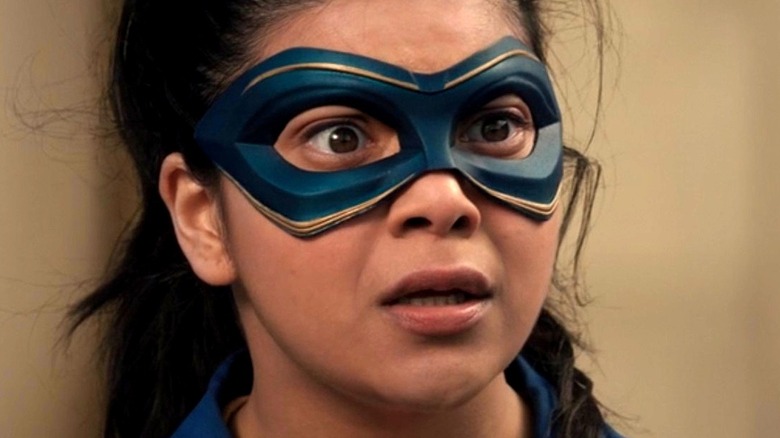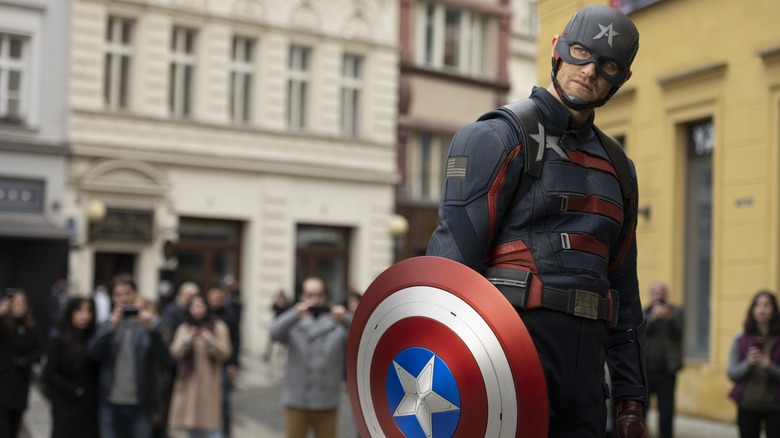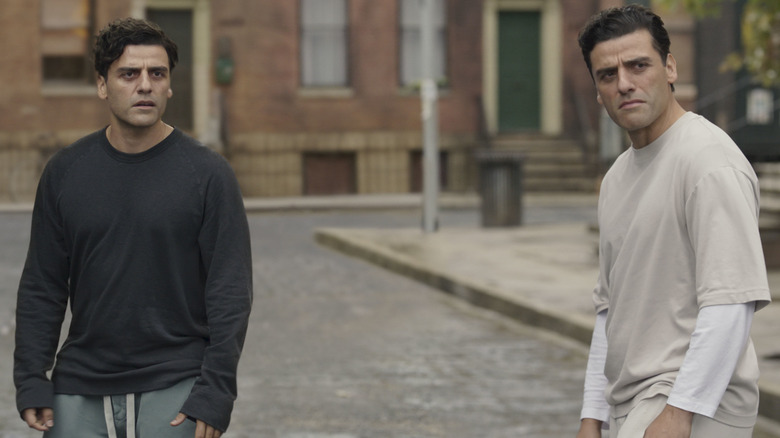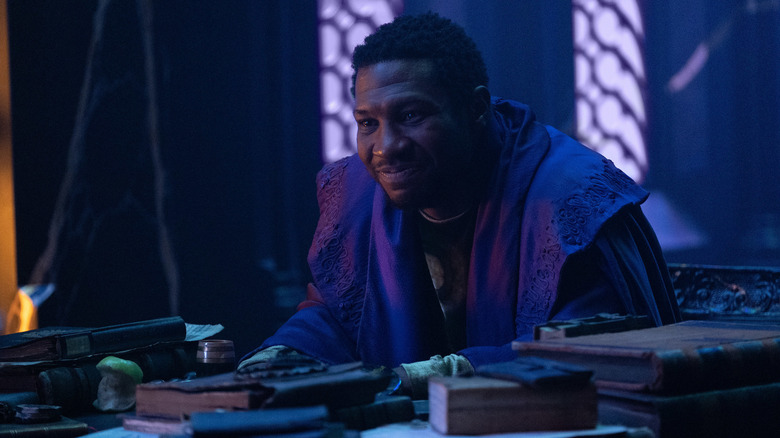Ms. Marvel Viewers Are Starting To Notice A Pattern In The MCU Disney+ Series
Television is formulaic. It can't be avoided. When something works, others follow it religiously. Whether talking about the classic path of stories or the typical breakdown of seasons, if you know what you are looking for, you may be able to predict what is coming, at least partly. Now that "Ms. Marvel" Episode 4 ("Seeing Red") has dropped on Disney+, some astute Marvel die-hards believe they have discovered a specific pattern to all Disney+ series.
After the most recent episode aired, fans took to Twitter to test out their theory with the other Marvel heads. @giselleb1234 tweeted, "One thing about Episode 4 of Marvel shows is that they're gonna end in cliffhangers." She then shared a collage of four pictures from different Marvel series in order to prove her point. @J4ys_5on took the theory to the next level with a further observation: "Holy s***, you're right; 4 is the cliffhanger, 5 is the flashback, and 6 is the resolution."
These observations would suggest that there is a very specific layout for each of the series and that fans could theoretically set their expectations by them. But does it hold up? So far, of the six live-action series set in the Marvel Cinematic Universe, only "WandaVision" has exceeded an episode count beyond six. For this reason, we'll eliminate the MCU's first series from this formula, but let's take a look and see how much water this theory holds in the other five series.
Episode 4 is the cliffhanger
Episode 4 of "Ms. Marvel" changes the scenery from Jersey City to a beautiful location filled with history and incredible landscapes. In this episode, Kamala (Iman Vellani) travels to Pakistan, where she gets advice and guidance from her grandmother, then meets the Red Daggers for more guidance and training. She joins them in a fight before unintentionally whisking herself back to the night of the Partition, where she sees the old train from her vision. Needless to say, this means Episode 4 leaves fans with a startling cliffhanger. But what about the other shows?
Episode 4 of "The Falcon and the Winter Soldier" and "Loki" both introduce rather abrupt changes in location as well, albeit to dark places without a lot to look at unless you are searching for Easter Eggs. Loki (Tom Hiddleston) finds himself transported to a strange world surrounded by three other variants of Loki. Similarly, "The Falcon and The Winter Soldier" takes audiences to Latvia, where the title characters attempt to locate the villainous Flag-Smashers. Notably, the episode also ends with John Walker (aka Captain America) (Wyatt Russell) killing a man by bashing his head with his shield, arguably the most shocking moment of the series.
Interestingly, while some series haven't opted for a sudden change of scenery, they have stuck with the abrupt cliffhanger at the end of Episode 4. In "Hawkeye," this episode treated audiences to the much-anticipated appearance of Yelena Bulova (Florence Pugh), while "Moon Knight" Episode 4 sees Marc and Steven (Oscar Issac) separated and face to face with a giant hippo goddess.
The idea that Episode 4 is constantly a cliffhanger seems to track. At the very least, there are shocking moments at the end of each fourth installment.
Episode 5 is the flashback
This theory also states that the fifth episode of each series is a flashback. Since not every episode has flashback scenes, this one may be a bit of a stretch. But let's look at the episodes and see what we can figure out. There may be some deeply buried thematic versions of flashbacks.
"Moon Knight" is the episode that adheres to this structure in the most straightforward way. Episode 5 centers around the story that ultimately gave us the different sides of Marc Spector's personality. Viewers get to see the tragic death of Marc's younger brother, a traumatic experience for Marc that leads to the creation of Steven. The flashback then jumps through how Marc's family dealt with the loss and builds the most substance for the character.
However, the other Disney+ series seem to focus less on traditional flashbacks and more on narrative tools to discuss the past. "Loki" explores all of the past deeds of the Lokis lost in the void, showing primary Loki who he is destined to become and how "glorious purpose" always seems to be the death of all Lokis. Likewise, "The Falcon and the Winter Soldier" uses the same trope as Sam Wilson (Anthony Mackie) returns to speak with Isaiah Bradley (Carl Lumbly). Sam offers Bradley the shield, but he quickly declines it, instead providing Sam with more detail about his past as a super soldier. Similarly, "Hawkeye" Episode 5 places particular emphasis on the title character's past as Ronin.
While all of the aforementioned series certainly zero in on the past, this part of the theory feels like a bit of a stretch as there is only one true flashback by our count. Let's test the last part of the theory.
Episode 6 is the resolution
To the most dedicated Marvel viewers, this one should seem pretty obvious. So far, the sixth episode of nearly every season has served as the conclusion. Because many of these are billed as "limited series," most shows aim to include an episode that ties everything up in a nice little bow. Interestingly, however, this has not been true in every story.
Not only does the first season of "Loki" end with an enormous cliffhanger, but it also introduces the big bad of the next phase of the MCU. With Kang (Jonathan Majors) revealed as He Who Remains, the series introduces the possibility that Kang the Conqueror could become the next Thanos-sized threat to the new Avengers. Of course, it also helps that we know Majors will play a big role in the upcoming "Ant-Man and the Wasp: Quantumania" (via Deadline).
However, beyond "WandaVision" and "Loki," most of the other series have remained fairly dedicated to resolving most issues in the sixth episode. The last episode of "Hawkeye" sees Clint Barton (Jeremy Renner) return to his family and hints that Kate Bishop (Hailee Steinfeld) could soon officially adopt the Hawkeye moniker. Likewise, the finale of "The Falcon and the Winter Soldier" finally sees Sam Wilson embrace his new role as the next Captain America, while the last episode of "Moon Knight" brings the death of the villainous Dr. Arthur Harrow (Ethan Hawke).
All and all, this is a fun theory, if not an entirely accurate one. While Episode 4 of Disney+ shows routinely appear to end with cliffhangers, the further proposed pieces of the theory don't always hold up nearly as well. Of course, if "Ms. Marvel" Episode 5 spends the entire episode in flashback form, it may well make up for the difference. Maybe "She-Hulk: Attorney at Law" will follow suit?



